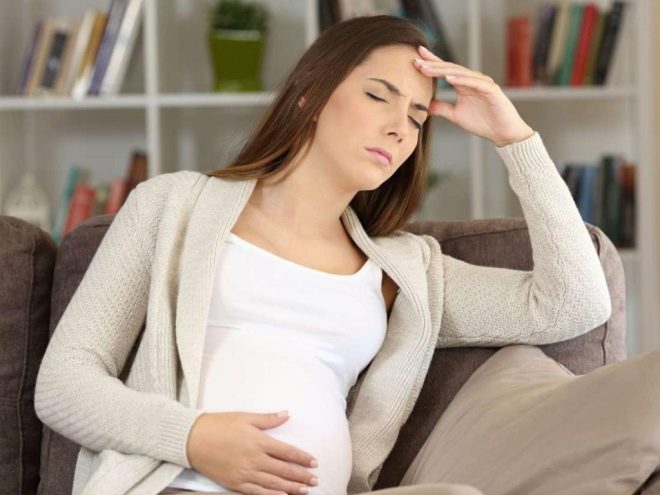Insomnia in the third trimester of pregnancy
The third trimester of pregnancy presents many unpleasant sensations to expectant mothers: it is difficult to carry a child, it is already large, the body is actively preparing for childbirth, and therefore pains of various origins become habitual companions of everyday life of pregnant women. Sometimes there is insomnia.
The reasons
Insomnia in its pure form (as the impossibility of falling asleep in principle) is not so common in expectant mothers. Much more often you can hear the complaints of women about the impossibility of a good sleep, intermittent and inadequate sleep, which does not give a feeling of rest.
Insomnia in medicine is called insomnia or dysomnia. Not every sleep disorder can be considered insomnia.
It is important for future mothers to understand that a bad sleep for a couple of days is not insomnia. Insomnia is a long clinical symptom that repeats at least 3 times a week.
Human sleep is regulated by the central nervous system. In late pregnancy, very often the cerebral cortex is over-excited, which ultimately is the basis of all the possible causes of insomnia known today. A future mother, shortly before giving birth, can fall asleep and sleep badly for the following reasons:
- the conditions in which she falls asleep are unfavorable: stuffy, noisy, uncomfortable bed, cramped, inconvenient to choose a pose for sleeping;
- a woman is under strong prolonged stress, such as fear of childbirth;
- a change in the usual routine: after going on maternity leave, many women begin to sleep longer in the morning, sleep during the day, and then for natural reasons have difficulty with night rest;
- the expectant mother consumes too much tea and chocolate (they, like coffee, contain caffeine);
- a pregnant woman has neurological diseases, endocrine pathologies, respiratory diseases;
- the bladder is compressed by a large and heavy uterus, and the woman several times during the night feels the need to empty it - frequent episodes of urination do not contribute to the normal course of sleep phases.
Most pregnant women in the last trimester are prone to depressive mood, any little thing can cause them a gloomy mood, increased anxiety.
Psychiatrists have not yet come to a common opinion about what was first - depression or insomnia. On the one hand, anxiety causes a lack of opportunity to fall asleep, and on the other, prolonged insomnia provokes anxiety.
It is difficult for a woman to toss and turn in her sleep - the future mother's possibilities are limited by two postures: on the right side and on the left. There are no other options. When turning from one side to the other, there is an increased load on the spine, pain in the pubic or coccyx can torment, which makes sleep “ragged”, superficial, unproductive.
Women exacerbate the situation themselves: every evening they begin to worry about it in advance, if they manage to fall asleep or not, which leads them to a state of anxiety and stress, the cerebral cortex is overdone and as a result it is impossible to fall asleep.
The skin on the abdomen, chest and thighs is stretched, itching may be present, it can also be difficult to sleep with it.
How dangerous is it?
Insomnia increases anxiety, a woman is often in a depressed mood, she does not tune in to giving birth positively, just as it is necessary for a successful delivery.The world sees her in dark colors, there is a large amount of stress hormones in her blood.
Considering that the child in the last third of the gestation period has its own hormonal background, and the mother does not affect him so much, Mom's insomnia, from this point of view, is not as dangerous for the fetus as it seems. The baby has its own cycle of sleep and wakefulness. But a small part of the stress hormones from the maternal blood still passes through the placental barrier and gets to the baby, which makes the fetus's behavior more restless.
Insomnia is more dangerous for the very future mother. Against the background of prolonged insomnia, the likelihood of developing true clinical depression increases, which may require psychiatric care, and the likelihood of postpartum depression increases. The memory of a woman suffers, it becomes difficult for her to perceive new information, to make decisions quickly.
The probability of cardiovascular diseases, in particular, heart attack and stroke, increases tenfold. The bones of women become more fragile - osteogenesis is disturbed. Women who suffer from severe insomnia, very quickly gaining excess weight, because they have a slow and defective metabolism throughout the day.
Is it possible drugs?
The inability to choose an effective sleeping pill causes pregnant women to be more inventive. In the third trimester, in contrast to the first two, more is permitted, and therefore such vegetative depressants as Persen and Novo-Passit (not alcohol tincture) can be available after consultation with the doctor (not alcohol tincture!). They, of course, do not affect the phases and mechanisms of sleep, but slightly relieve nervous system over-stimulation, reduce anxiety, which creates prerequisites for normal sleep.
Some find salvation in homeopathic preparations, for example, in Nervohel, but their action (according to scientists of the Russian Academy of Sciences, who recognized pseudoscience homeopathy) is a placebo effect: a woman drinks peas from a homeopathic remedy, believes that heals nerves, calms down and falls asleep. Despite the lack of a proven effect on homeopathy, if it helps you, then why not.
How to fix a dream?
To understand how to cope with insomnia without drugs, you need to take another careful look at the causes of insomnia in the later stages. By eliminating them, you can achieve a great effect.
- Go to bed only in a well-ventilated room, if possible, in the winter sleep with an open window, in the summer - with an open balcony door. Fresh air will make sleep more sound.
- Make sure that the mattress is moderately soft - the spine should be even in a dream, a woman can not fall into a too soft feather bed, but should not suffer from the hard surface of the bed.
- Use a special pillow for pregnant women - it allows you to conveniently place the upper leg in a pose on the side and supports the stomach.
- Take a walk before bedtime in the fresh air. While you can walk with your spouse or alone. A family tradition will gradually be formed - to walk before bedtime, because after giving birth, you will have to go for a walk with your baby before bedtime.
- Even on maternity leave, stick to the daily regimen; do not sleep too long during the daytime; fill the day with events, deeds, and movement.
- At bedtime, do not do anything responsible, requiring voltage. Take a shower, turn on the aroma lamp, ask your spouse to do a foot massage - it will definitely calm you down and set you up for a light sleep.
- Contact a psychologist or attend classes in school for pregnant women - they will learn how to effectively deal with the fear of childbirth. This will help get rid of anxiety, tune in to easy and fast labor without pain and tears, which will definitely help in the birth process.
- In order to wake up to the toilet less often because of “little need” at night, you should stop drinking the liquid after 7 pm, and you should visit the toilet before going to bed. If a woman cannot fall asleep due to pruritus and stretch marks, you should use moisturizing fat creams or special means to prevent stretch marks.
- Try to sleep in complete silence and darkness. Even the ticking of the clock can prevent a woman from relaxing, and therefore get blackout curtains and remove everything from the bedroom that makes sounds and glows in the dark.
About the causes of sleep disorders during pregnancy can be found in the following video.













